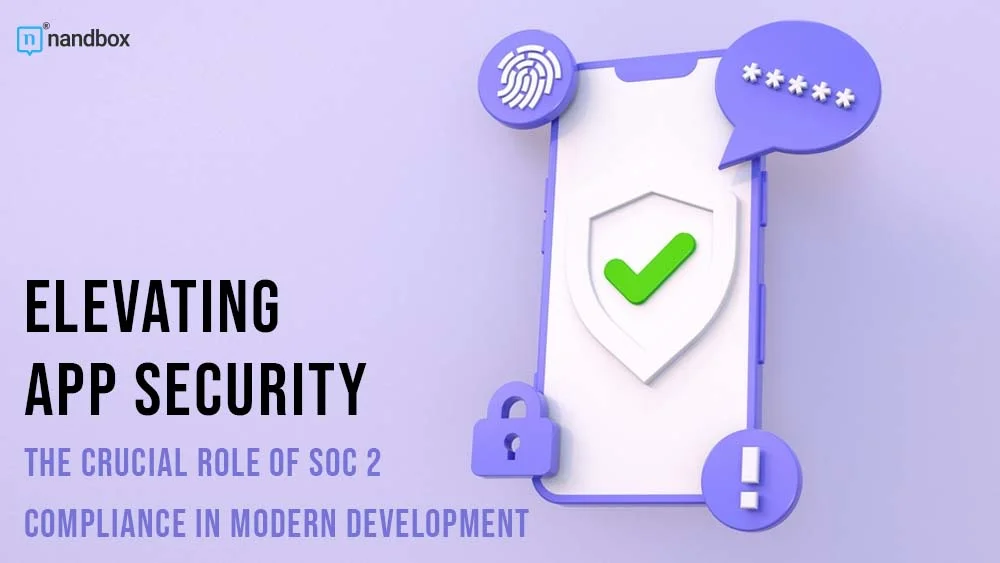In an era where mobile apps are integral to business success, ensuring the security and privacy of user data has never been more critical. As app development becomes more accessible to businesses of all sizes, the need for robust security measures becomes paramount. This article explores the importance of SOC 2 compliance in the context of app development and how it can enhance the trustworthiness and security of mobile applications.
Understanding SOC 2 Compliance in App Development
SOC 2 (Service Organization Control 2) is a framework developed by the American Institute of Certified Public Accountants (AICPA) to ensure that service providers, including app development platforms, securely manage data to protect the interests of their organization and the privacy of their clients. For app developers, SOC 2 compliance is particularly crucial as it demonstrates a commitment to maintaining high standards of information security and data protection.
SOC 2 compliance is based on five Trust Services Criteria:
- Security: Protecting against unauthorized access to systems and data.
- Availability: Ensuring systems are available for operation and use as committed.
- Processing Integrity: Verifying that system processing is complete, accurate, and timely.
- Confidentiality: Safeguarding confidential information as agreed.
- Privacy: Handling personal information in line with privacy policies and GAPP (Generally Accepted Privacy Principles).
Streamlining SOC 2 Compliance
While achieving SOC 2 compliance can be complex, innovative solutions are emerging to simplify the process. Platforms like Oneleet offer tools to streamline SOC 2 compliance, making it more accessible for businesses of all sizes. These solutions can be particularly beneficial for app developers who want to ensure their apps meet SOC 2 standards without getting overwhelmed by the technical details.
By leveraging such compliance management tools, app developers can:
- Automate many aspects of the compliance process.
- Continuously monitor their app’s adherence to SOC 2 standards.
- Quickly identify and address potential security gaps.
- Demonstrate their commitment to security to clients and partners.
Enhancing App Security Through SOC 2 Compliance
Implementing SOC 2 compliance in app development offers several key benefits:
- Strengthened data protection measures for apps and their users.
- Enhanced overall security posture of the development environment.
- Assurance to users that their app data is handled securely and responsibly.
- Demonstration of commitment to industry-leading security practices.
The Benefits of SOC 2 Compliance for App Developers
For businesses and individuals creating apps, SOC 2 compliance offers numerous advantages:
- Enhanced Trust: SOC 2 compliance builds customer confidence by demonstrating a commitment to data security and privacy in your apps.
- Competitive Advantage: Many clients and partners require apps to be built on SOC 2 compliant platforms, making it a valuable differentiator in the market.
- Risk Mitigation: The framework helps identify and address potential security vulnerabilities in the app development process, reducing the risk of data breaches.
- Improved App Quality: Adhering to SOC 2 standards often leads to better overall app design and functionality, with a focus on security and reliability.
- Legal Protection: Developing apps with SOC 2 compliance in mind can help protect your business from legal issues related to data breaches or privacy violations.
- Global Recognition: While SOC 2 is a U.S. standard, it is widely recognized internationally, making it valuable for apps targeting global markets.
Challenges in Achieving SOC 2 Compliance
While SOC 2 compliance offers significant benefits, it can present challenges for app developers:
- Understanding Requirements: Grasping the intricacies of SOC 2 compliance can be complex, especially for those new to app development.
- Ongoing Maintenance: Ensuring your app remains compliant requires continuous monitoring and updates.
- Resource Allocation: Dedicating time and resources to security measures can be challenging, especially for small businesses or individual developers.
- Balancing Innovation and Security: Maintaining compliance while pushing the boundaries of app functionality can be a delicate balance.
Best Practices for SOC 2 Compliant App Development
To leverage SOC 2 compliance effectively when developing apps, consider these best practices:
- Utilize Built-in Security Features: Take full advantage of the security features and controls provided by your development platform.
- Regular Security Audits: Conduct periodic reviews of your app’s security measures.
- Data Minimization: Collect and store only essential user data to reduce potential security risks.
- Encryption: Implement strong encryption for data transmission and storage within your app.
- User Authentication: Implement robust user authentication mechanisms.
- Third-party Integrations: Carefully vet any third-party services integrated into your app for security compliance.
- Regular Updates: Keep your app updated with the latest security patches and improvements.
- User Education: Provide clear information to your app users about data handling and security practices.
The Future of App Security and Compliance
As the app development landscape evolves, security and compliance will continue to be critical factors. Future trends in app security and compliance include:
- AI-Powered Security: Incorporation of artificial intelligence for real-time threat detection and response in apps.
- Enhanced Privacy Controls: More granular and user-friendly privacy settings for app users.
- Blockchain for Data Integrity: Utilization of blockchain technology to ensure data integrity and transparency.
- Automated Compliance Checks: Integration of automated compliance monitoring tools within development platforms.
- Edge Computing Security: Addressing security challenges associated with edge computing in mobile apps.
- Quantum-Resistant Encryption: Preparation for the era of quantum computing by implementing quantum-resistant encryption in apps.
Conclusion
In the rapidly evolving world of app development, SOC 2 compliance is not just a nice-to-have; it’s a critical component of building trustworthy and secure applications. By prioritizing SOC 2 compliance, app developers can ensure they’re building on a foundation of robust security practices.
As we move forward in the digital age, those who prioritize security and compliance in their app development process will be best positioned to succeed, innovate, and maintain the trust of their users. Embrace the power of SOC 2 compliance to create apps that not only meet business needs but also provide the highest levels of security and reliability in today’s competitive app marketplace.




